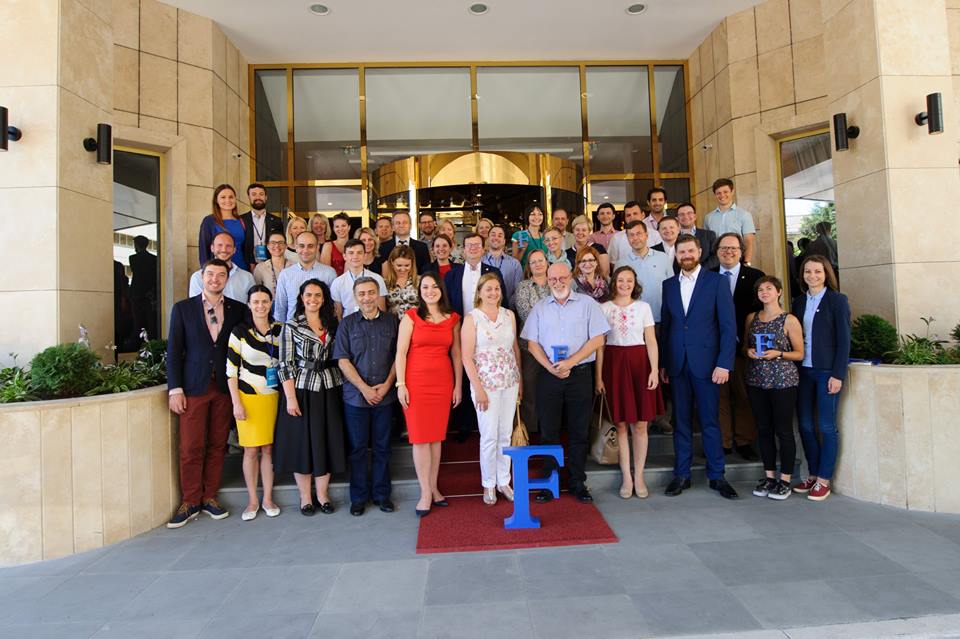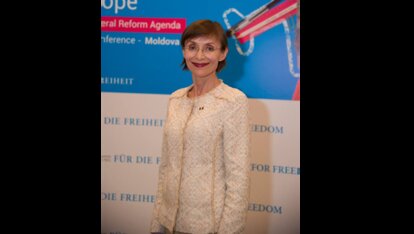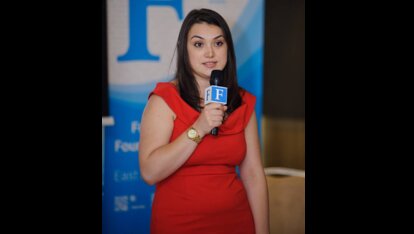The Best Education for Europe International Conferene


Minister Corina Fusu
“We cannot have good education in the 21st century with an education system from the 20th century. It is high time we consolidate our efforts and modernize Moldovan education. We should invest in the new system, not the old.” called for Ms. Corina Fusu, Minister of Education of the Republic of Moldova in her keynote speech during an international conference in Chisinau from 11-13 July. The “The Best Education for Europe” conference gathered around 30 international and many Moldovan experts in Chisinau to discuss the liberal reform agenda for best education. The three-day event was organized by the Regional Office of the Friedrich Naumann Foundation for Freedom (FNF) for East and Southeast Europe and the Ministry of Education of the Republic of Moldova under the auspices of Ms. Corina Fusu. Dr Rainer Adam, Regional Director of FNF East and Southeast Europe, warmly welcomed more than 130 guests on the first day of the conference, which encompassed a keynote speech by the Minister, presentation of a study on education in Moldova and a panel discussion on the “Best Practices and Current Trends from Europe”.
Findings from the Study of the Perception of the Moldovan Education System
One of the conference highlights was the official presentation of the results of the study “Perception of the Moldovan Education System’’ and the launch of its publication, which are supported by FNF. Doru Petruti, General Director of the IMAS Institute, who conducted the study, underlined the significance that the Ministry of Education has agreed to publish the study, despite some of its findings are negative. In her keynote speech, Minister Fusu underlined that the Ministry will use the study as a starting point for an Action Plan for education in Moldova. Mr Petruti outlined three areas from the comprehensive study that call for change: migration to study abroad, widespread corruption, and the attitudes of both the beneficiaries and the people, working in education.
Anatol Gremalschi, author of the publication, presented some of the study results. 45% of the students are willing to pay for a license degree. Furthermore, 7 out of 10 parents prefer their children to study abroad. According to the findings, it is true that young people vote with their legs, but in the same time it was noted that the Moldovan system encourages mystification of studying abroad.
Expert Opinions for Education Challenges and Reform Proposals from Moldova, Romania, Lithuania, Estonia
One of the topics raised both in the study presentation and the subsequent panel discussion with high-level experts from Moldova, Romania, Lithuania and Estonia was the intoxication of the education system with reform efforts, its risks and implications. Besides Corina Fusu, on the panel participated Sorin Cimpeanu, former Minister of Education of Romania. He pointed out that there is “reluctance of society to educational reform, especially among the already involved in the field”. In Romania only in the last 4 years around 10 Ministers of Education changed, every one of whom had his own reform agenda. Reform in the education system is still necessary despite the difficulties and the legacy of reform efforts in the past. Mr Cimpeanu concluded that “we educate for the sake of society. Thus, we need to consult the civil society about education reform. In Romania we do it every 3 years”.
A common issue addressed by all panellists was that quality education needs quality teachers. According to Sorin Cimpeanu “the vicious circle can be broken only by further training of teachers”, while Mihkel Lees from Estonia shared that they will continue raising the teachers’ salaries, although they have already more than doubled, as Estonians “want the best of the best to teach the best students”. Minister Fusu also believes that the remuneration model of teachers in Moldova is outdated, and that it needs change linked with performance. The former Minister of Education from Lithuania, Gintaras Steponavicius pointed out that the prestige of the teacher’s profession should be raised in our societies in East and Southeast Europe. Singapore and Finland were given as best case examples, where the teacher’s profession is highly respected. Yet another way to make this career path more attractive, according to the Lithuanian expert, is to the decrease the bureaucracy and the paper load for teachers, which can lead not only to more creativity and enthusiasm, but also to money savings.
Another key conclusion from the expert panel discussion was that we need more choice for students, parents and schools. The best case example from Lithuanian voucher system on four levels (general education, pre-school, higher education, after school) demonstrates the benefits that competition in education can bring. Gintaras Steponavicius called for “empowering society to have more say in the education system. One way would be to inform parents and civil society organizations where their taxes and funding goes in the education system”. Another recommendation is to “create ownership of the education system both in the state institutions and in the parents”.
The Adviser to the Minister of Education and Research in Estonia, Mihkel Lees, summarized that the cornerstone of the education system is to provide free equal education access, according to the abilities and skills of students, including people with special needs . According to him, “every child should get the right education for him or her”. In order to achieve this in the 21st century the teachers-pupils relationship should change, as Steponavicius pointed out. Pupils should not be punished for their mistakes, but their curiosity should be encouraged, since kindergarten on.
Insights from Case Studies from European Countries and Expert Working Groups
One of the key insights from the first day to “Give more choice and empower students, parents and schools” was further elaborated on the second and third day of the conference, where a group of 50 international and Moldovan experts discussed in smaller working groups their vision, challenges and recommendations for best education. Two subsequent panel discussions on the second day gave grounds for further consideration, presenting case studies and best practices from Austria, Poland, Hungary, Bulgaria, Lithuania, Russia, and USA. After the insightful and frank sharing of experiences by experts, the group split up in three working groups, devoted to primary and secondary education, higher education and lifelong learning/labour market.

Vice-Minister of Education, Cristina Boaghi
During the closing ceremony, the Vice-Minister of Education of Moldova, Cristina Boaghi, assured the participants that their recommendations will be taken into consideration in the Action Plan of the Ministry. “Yesterday, we were dreaming of the best education in Europe. Today, we are already discussing action steps for better education in Moldova”. Quoting Eleanor Roosevelt, “Small minds discuss people, average minds discuss events, great minds discuss ideas”, Ms Boaghi expressed her gratitude to the contributions of all participants and to FNF. Daniel Kaddik, Project Director of FNF Southeast Europe, underlined once again the commitment of the Friedrich Naumann Foundation for Freedom to work in the field of education and to cooperate with the state in Moldova for improving the education system.
Stay tuned for a series of videos and interviews from the conference soon. On the Facebook page of FNF ESEE you can find some Facebook live videos from the different conference sessions.